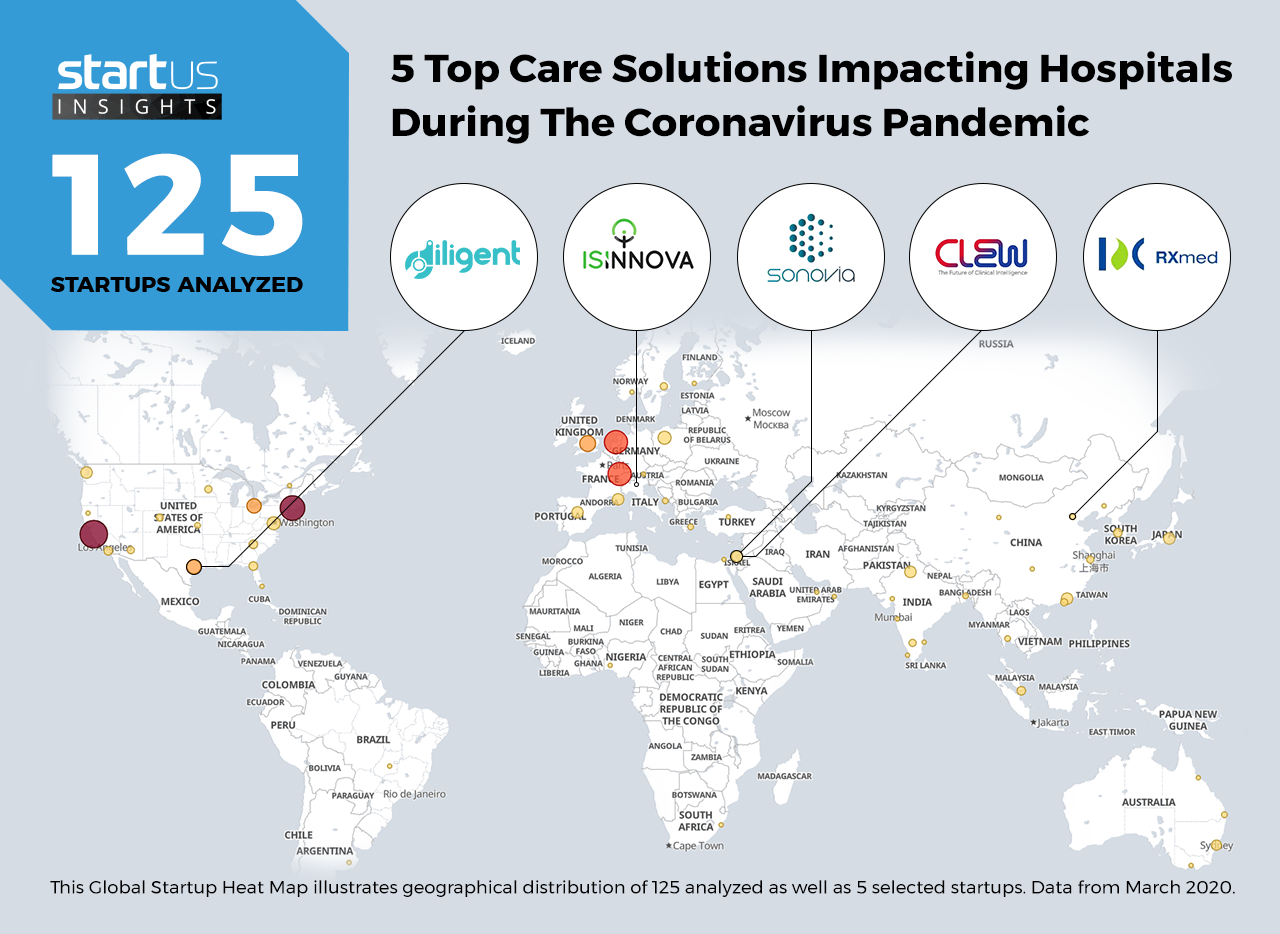Our Innovation Analysts recently looked into emerging technologies and up-and-coming startups working on hospital care solutions for the coronavirus pandemic.
Heat Map: 5 Top Hospital Care Solutions
We use a data-driven startup scouting approach to identify the most relevant solutions globally. The Global Startup Heat Map below highlights 5 interesting examples out of 125 relevant solutions. Diligent Robotics, Isinnova, Sonovia, CLEW, and Ruxin Medical develop 5 top solutions to watch out for.
Diligent Robotics – Hospital Robots
Hospital robots perform a range of important tasks, that include screening patients, disinfecting hospital rooms, delivering lab samples, fetching medical tools, and collecting waste from patients. During a pandemic such as the COVID-19 outbreak, they reduce the risk of doctors and nurses getting infected. The robots also free up time for medical staff, allowing them to focus on patient-facing tasks.
Diligent Robotics is a US-based startup developing an autonomous hospital robot assistant. Moxi is powered by an artificial intelligence (AI) framework that enables social intelligence, mobile manipulation, and human-guided learning. The robot comes equipped with a flexible arm, gripper hand, and a mobile base to navigate a clinic’s hallways. It thereby helps medical staff with non-patient-facing tasks.
Isinnova – 3D Printed Ventilator Valve
In areas most affected by the Coronavirus, a large number of patients may die without artificial ventilation. Meanwhile, suppliers are unable to meet the unprecedented demand for these components. As a result, hospitals are facing severe shortages of ventilator valves. Additive manufacturing companies are tackling this problem with 3D printing, allowing for fast, inexpensive, and on-demand production of ventilator valves. However, this solution has its drawbacks, such as lack of regulatory approval and previous testing.
Italy-based startup Isinnova develops additive manufacturing-based solutions. They reverse-engineered, and 3D printed a crucial valve for one of the Italian hospitals during the coronavirus pandemic. The valves were printed directly at the hospital after their supplies ran dry. Not to rest on their achievement, the startup is now collaborating with medical professionals to address the challenge of a possible shortage of continuous positive airway pressure (C-PAP) masks needed for sub-intensive therapy.
Sonovia – Anti-Pathogen Fabric
Startups around the world are working to develop fabric with anti-pathogen properties that will be used for protective masks and clothing. Such antiviral protective gear is especially needed during the time of the COVID-19 outbreak as it helps protect medical staff at hospitals from exposure to coronavirus.
Sonovia is an Israeli startup utilizing a nano-coating ultrasonic technology to harnesses the power of sound waves to infuse fabrics with antiviral chemicals. Unlike other antimicrobial fabrics that use silver and, therefore, are quite expensive, Sonovia uses cheaper metal-oxide nanoparticles, such as zinc oxide and copper oxide.
CLEW – AI For Critical Care
AI-enabled software and predictive analytics algorithms provide real-time risk stratification and acuity measurement for critical care. This is important in times of pandemics, such as the coronavirus outbreak. These solutions enable timely interventions and, as a result, improve the prognosis for critically ill patients and reduce the load on the healthcare facilities.
Israel-based startup CLEW develops an AI-powered predictive analytics platform for critical care. The solution utilizes the vast amount of available patient data as well as machine learning algorithms and models to make predictions at the individual patient level. Besides predictive analytics, the platform enables workflow improvements and dynamic worklist prioritization. The solution integrates with existing electronic medical record (EMR) systems.
Ruxin Medical – Artificial Cough Device
Artificial cough devices clear phlegm from the airways of patients on artificial ventilation. These devices have the potential to assist hospitals in the treatment of coronavirus victims, many of whom are suffering from pneumonia and need artificial ventilation. It is less invasive and less contact alternative to the traditional way of removing phlegm, where a nurse disconnects a patient from the machine and uses a catheter to suction up secretions.
Ruxin Medical is a Chinese startup that commercializes CoughSync, an artificial cough device. The device was originally developed in Israel and is designed for people on ventilators. The device simulates a normal cough, therefore helping patients with pneumonia to get rid of phlegm. CoughSync is a more natural and less invasive alternative to conventional methods of removing secretions from the patient’s airways.
How To Flatten The Curve?
This is an unprecedented situation for many of us across the world. The SARS outbreak in the early 2000s claimed 774 lives. That toll was enough to drive research & development and easier healthcare solutions. The fact that several mobile health, e-health, remote health, hospital care, and diagnostics startups and companies are able to respond during a real epidemic is encouraging. With thousands of deaths already, we expect to see numerous new companies offering technology-driven solutions to help doctors, nurses, other health workers, and the larger public.










